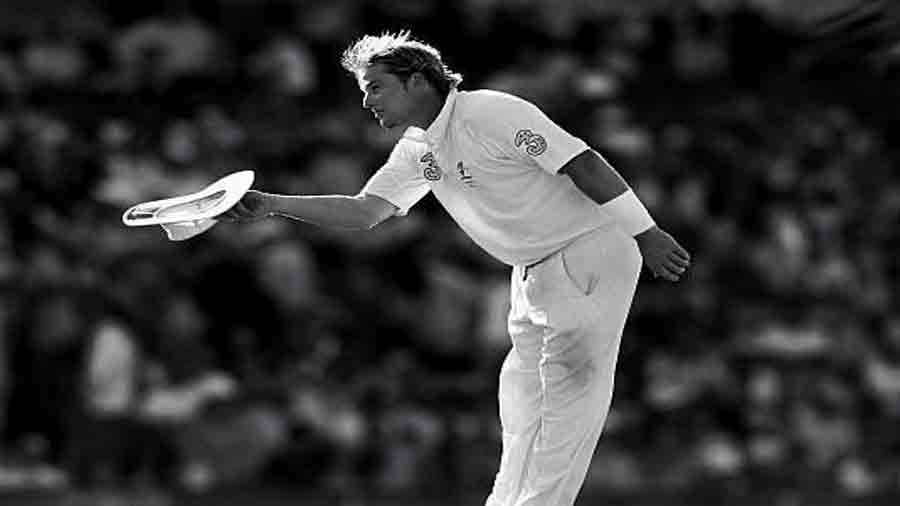More than three weeks after Shane Warne's death at a Thailand villa, his statue at the Melbourne Cricket Ground remains decorated with flowers, cigarettes and beer cans left by fans mourning the loss of one of cricket's most authentic characters.
Australians will remember Warne at a televised memorial service at his home stadium on Wednesday, with nearly 50,000 people to attend the venue where the spin bowling great captured his 700th test wicket against Ashes foes England.
Many will be seated in the southern grandstand, re-named the S.K. Warne Stand in the wake of his death at age 52.
"He made mistakes and had a few hiccups but he was genuine about stuff," said Bill Patterson of Melbourne, sharing a drink with friends by Warne's statue. "He was just a normal person as well as being amazing from a cricketing point of view. He was a bit of a rogue but a good fellow and people recognise that."
Australia loves sporting heroes like few other countries. The captaincy of the test team has long been dubbed "the second most important office" after that of the Prime Minister.
But deeper affections are often reserved for athletes with a mischievous streak, who rise from humble beginnings, thumb their nose at convention and own their flaws and shine with talent.
A lifelong smoker and a dietician's nightmare, Warne ticked all of those boxes through a career of brilliance and scandal.
"Not everyone follows cricket in Australia but everyone knows Shane Warne and it's kind of taken the wind out of many of us," said Inkie Bissell, a radio broadcaster from northern Queensland state.
High-profile athletes, politicians and celebrities will attend the memorial on Wednesday, underscoring Warne's appeal as a sporting showman.
Ordinary Australians have paid their respects in simpler ways, leaving cricket bats in their front gardens scrawled with "R.I.P. Warney".
Much of Warne's life resonates for Australians, most of whom would identify with his suburban upbringing and his determination to live life to the fullest.
The son of aspirational, working-class parents, Warne grew up in a sleepy Melbourne suburb laden with sporting fields and a short bike ride to a beach.
By his own admission, he was "no academic" but his talent in both cricket and Australian Rules football, his first sporting love, earned him a scholarship to a private school.
In an era when corporal punishment was still in vogue, he was regularly given "the cane" by the principal, his backside whacked for breaking school rules or giving cheek to teachers.
He passed his school exams but was devastated to miss out on a professional contract with the local Aussie Rules football team, St Kilda.
Among a slew of odd jobs, he delivered pizzas while trying to forge a career in cricket as a teenager but admitted in his autobiography he had trouble saving money because he kept eating the product.
A few years later, he could afford to dine at the world's finest restaurants but his love for junk food never dimmed.
It came as little surprise to Australians that his final meal before his death was the country's quintessential snack of Vegemite on toast - the brown, salty spread laid on buttery bread that most foreigners find inedible.
After quitting cricket, he continued the touring life as a respected commentator but always returned to his homes in Melbourne's bay-side region, where he once tore around in beaten-up cars as a teenager.
The members at East Sandringham Cricket Club, where Warne competed in his boyhood, took his death hard.
They fondly remember the Saturday afternoon in 2015 when Warne, four years retired from professional cricket, returned to play in a club match for the senior side to limber up for an exhibition game in the United States.
Some 700 people turned up to the suburban clash, which would normally draw a few dozen.
Warne took a couple of wickets on the synthetic pitch, slogged some 40 runs and signed dozens of autographs.
He also arranged 10 cases of beer to be delivered and lingered for hours after the game for drinks in the club rooms, Kim Pitt, a former president of East Sandringham and a friend of the Warne family, told Reuters.
"No matter what people's views were of Shane, very quickly they would be won over by him when they met him in person," said Pitt. "He made a few blues (mistakes) over the journey, but he never ran away from them. People love him for that."










